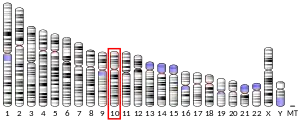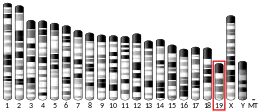G protein-coupled receptor kinase 5 is a member of the G protein-coupled receptor kinase subfamily of the Ser/Thr protein kinases, and is most highly similar to GRK4 and GRK6.[5][6][7] The protein phosphorylates the activated forms of G protein-coupled receptors to regulate their signaling.
Function
G protein-coupled receptor kinases phosphorylate activated G protein-coupled receptors, which promotes the binding of an arrestin protein to the receptor. Arrestin binding to phosphorylated, active receptor prevents receptor stimulation of heterotrimeric G protein transducer proteins, blocking their cellular signaling and resulting in receptor desensitization. Arrestin binding also directs receptors to specific cellular internalization pathways, removing the receptors from the cell surface and also preventing additional activation. Arrestin binding to phosphorylated, active receptor also enables receptor signaling through arrestin partner proteins. Thus the GRK/arrestin system serves as a complex signaling switch for G protein-coupled receptors.[8]
GRK5 and the closely related GRK6 phosphorylate receptors at sites that encourage arrestin-mediated signaling rather than arrestin-mediated receptor desensitization, internalization and trafficking (in contrast to GRK2 and GRK3, which have the opposite effect).[9][10] This difference is one basis for pharmacological biased agonism (also called functional selectivity), where a drug binding to a receptor may bias that receptor’s signaling toward a particular subset of the actions stimulated by that receptor.[11][12]
GRK5 is widely expressed throughout the body, but with notably high expression in the lung, heart and placenta, with widespread expression at lower levels.[13] In humans, a GRK5 sequence polymorphism at residue 41 (leucine rather than glutamine) that is most common in individuals with African ancestry leads to elevated GRK5-mediated desensitization of airway beta2-adrenergic receptors, a drug target in asthma.[14] In the mouse, GRK5 regulates the M2 subtype of Muscarinic acetylcholine receptors in airways and neurons, and mice lacking GRK5 have been proposed as a model for Alzheimer’s disease.[15][16][17] In zebrafish and in humans, loss of GRK5 function has been associated with heart defects due to heterotaxy, a series of developmental defects arising from improper left-right laterality during organogenesis.[18] Overexpression of GRK5 in the heart of mice has shown that GRK5 regulates beta2-adrenergic receptors, but GRK5 overexpression or deletion does not affect signaling by the angiotensin II AT1 receptor in the heart.[19][20]
References
- 1 2 3 GRCh38: Ensembl release 89: ENSG00000198873 - Ensembl, May 2017
- 1 2 3 GRCm38: Ensembl release 89: ENSMUSG00000003228 - Ensembl, May 2017
- ↑ "Human PubMed Reference:". National Center for Biotechnology Information, U.S. National Library of Medicine.
- ↑ "Mouse PubMed Reference:". National Center for Biotechnology Information, U.S. National Library of Medicine.
- ↑ Kunapuli P, Benovic JL (Jun 1993). "Cloning and expression of GRK5: a member of the G protein-coupled receptor kinase family". Proceedings of the National Academy of Sciences. 90 (12): 5588–92. Bibcode:1993PNAS...90.5588K. doi:10.1073/pnas.90.12.5588. PMC 46766. PMID 7685906.
- ↑ Premont RT, Inglese J, Lefkowitz RJ (1995). "Protein kinases that phosphorylate activated G protein-coupled receptors". The FASEB Journal. 9 (2): 175–182. doi:10.1096/fasebj.9.2.7781920. PMID 7781920. S2CID 20428064.
- ↑ "Entrez Gene: GRK5 G protein-coupled receptor kinase 5".
- ↑ Gurevich VV, Gurevich EV (2019). "GPCR Signaling Regulation: The Role of GRKs and Arrestins". Frontiers in Pharmacology. 10: 125. doi:10.3389/fphar.2019.00125. PMC 6389790. PMID 30837883.
- ↑ Kim J, Ahn S, Ren XR, Whalen EJ, Reiter E, Wei H, Lefkowitz RJ (2005). "Functional antagonism of different G protein-coupled receptor kinases for beta-arrestin-mediated angiotensin II receptor signaling". Proceedings of the National Academy of Sciences. 102 (5): 1442–1447. Bibcode:2005PNAS..102.1442K. doi:10.1073/pnas.0409532102. PMC 547874. PMID 15671181.
- ↑ Ren XR, Reiter E, Ahn S, Kim J, Chen W, Lefkowitz RJ (2005). "Different G protein-coupled receptor kinases govern G protein and beta-arrestin-mediated signaling of V2 vasopressin receptor". Proceedings of the National Academy of Sciences. 102 (5): 1448–1453. Bibcode:2005PNAS..102.1448R. doi:10.1073/pnas.0409534102. PMC 547876. PMID 15671180.
- ↑ Zidar DA, Violin JD, Whalen EJ, Lefkowitz RJ (2009). "Selective engagement of G protein coupled receptor kinases (GRKs) encodes distinct functions of biased ligands". Proceedings of the National Academy of Sciences. 106 (24): 9649–9654. Bibcode:2009PNAS..106.9649Z. doi:10.1073/pnas.0904361106. PMC 2689814. PMID 19497875.
- ↑ Choi M, Staus DP, Wingler LM, Ahn S, Pani B, Capel WD, Lefkowitz RJ (2018). "G protein-coupled receptor kinases (GRKs) orchestrate biased agonism at the β2-adrenergic receptor". Science Signaling. 11 (544): eaar7084. doi:10.1126/scisignal.aar7084. PMID 30131371.
- ↑ Kunapuli P, Benovic JL (1993). "Cloning and expression of GRK5: a member of the G protein-coupled receptor kinase family". Proceedings of the National Academy of Sciences. 90 (12): 5588–5592. Bibcode:1993PNAS...90.5588K. doi:10.1073/pnas.90.12.5588. PMC 46766. PMID 7685906.
- ↑ Wang WC, Mihlbachler KA, Bleecker ER, Weiss ST, Liggett SB (2008). "A polymorphism of G-protein coupled receptor kinase5 alters agonist-promoted desensitization of beta2-adrenergic receptors". Pharmacogenetics and Genomics. 18 (8): 729–732. doi:10.1097/FPC.0b013e32830967e9. PMC 2699179. PMID 18622265.
- ↑ Gainetdinov RR, Bohn LM, Walker JK, Laporte SA, Macrae AD, Caron MG, Lefkowitz RJ, Premont RT (1999). "Muscarinic supersensitivity and impaired receptor desensitization in G protein-coupled receptor kinase 5-deficient mice". Neuron. 24 (4): 1029–1036. doi:10.1016/S0896-6273(00)81048-X. PMID 10624964. S2CID 7788715.
- ↑ Walker JK, Gainetdinov RR, Feldman DS, McFawn PK, Caron MG, Lefkowitz RJ, Premont RT, Fisher JT (2004). "G protein-coupled receptor kinase 5 regulates airway responses induced by muscarinic receptor activation". American Journal of Physiology. Lung Cellular and Molecular Physiology. 286 (2): L312–L319. doi:10.1152/ajplung.00255.2003. PMID 14565944.
- ↑ He M, Singh P, Cheng S, Zhang Q, Peng W, Ding X, Li L, Liu J, Premont RT, Morgan D, Burns JM, Swerdlow RH, Suo WZ (2016). "GRK5 Deficiency Leads to Selective Basal Forebrain Cholinergic Neuronal Vulnerability". Scientific Reports. 6: 26116. Bibcode:2016NatSR...626116H. doi:10.1038/srep26116. PMC 4872166. PMID 27193825.
- ↑ Lessel D, Muhammad T, Casar Tena T, Moepps B, Burkhalter MD, Hitz MP, Toka O, Rentzsch A, Schubert S, Schalinski A, Bauer UM, Kubisch C, Ware SM, Philipp M (2016). "The analysis of heterotaxy patients reveals new loss-of-function variants of GRK5". Scientific Reports. 6: 33231. Bibcode:2016NatSR...633231L. doi:10.1038/srep33231. PMC 5020398. PMID 27618959.
- ↑ Rockman HA, Choi DJ, Rahman NU, Akhter SA, Lefkowitz RJ, Koch WJ (1996). "Receptor-specific in vivo desensitization by the G protein-coupled receptor kinase-5 in transgenic mice". Proceedings of the National Academy of Sciences. 93 (18): 9954–9959. Bibcode:1996PNAS...93.9954R. doi:10.1073/pnas.93.18.9954. PMC 38536. PMID 8790438.
- ↑ Rajagopal K, Whalen EJ, Violin JD, Stiber JA, Rosenberg PB, Premont RT, Coffman TM, Rockman HA, Lefkowitz RJ (2006). "Beta-arrestin2-mediated inotropic effects of the angiotensin II type 1A receptor in isolated cardiac myocytes". Proceedings of the National Academy of Sciences. 103 (44): 16284–16289. Bibcode:2006PNAS..10316284R. doi:10.1073/pnas.0607583103. PMC 1637574. PMID 17060617.
Further reading
- Komolov KE, Bhardwaj A, Benovic JL (Aug 2015). "Atomic Structure of GRK5 Reveals Distinct Structural Features Novel for G Protein-coupled Receptor Kinases". Journal of Biological Chemistry. 290 (34): 20629–47. doi:10.1074/jbc.M115.647297. PMC 4543624. PMID 26032409.
- Bullrich F, Druck T, Kunapuli P, Gomez J, Gripp KW, Schlegelberger B, Lasota J, Aronson M, Cannizzaro LA, Huebner K (1995). "Chromosomal mapping of the genes GPRK5 and GPRK6 encoding G protein-coupled receptor kinases GRK5 and GRK6". Cytogenetics and Cell Genetics. 70 (3–4): 250–4. doi:10.1159/000134045. PMID 7789183.
- Kunapuli P, Gurevich VV, Benovic JL (Apr 1994). "Phospholipid-stimulated autophosphorylation activates the G protein-coupled receptor kinase GRK5". The Journal of Biological Chemistry. 269 (14): 10209–12. doi:10.1016/S0021-9258(17)34046-2. PMID 8144599.
- Kunapuli P, Onorato JJ, Hosey MM, Benovic JL (Jan 1994). "Expression, purification, and characterization of the G protein-coupled receptor kinase GRK5". The Journal of Biological Chemistry. 269 (2): 1099–105. doi:10.1016/S0021-9258(17)42226-5. PMID 8288567.
- Nagayama Y, Tanaka K, Hara T, Namba H, Yamashita S, Taniyama K, Niwa M (Apr 1996). "Involvement of G protein-coupled receptor kinase 5 in homologous desensitization of the thyrotropin receptor". Journal of Biological Chemistry. 271 (17): 10143–8. doi:10.1074/jbc.271.17.10143. PMID 8626574.
- Oppermann M, Freedman NJ, Alexander RW, Lefkowitz RJ (May 1996). "Phosphorylation of the type 1A angiotensin II receptor by G protein-coupled receptor kinases and protein kinase C". Journal of Biological Chemistry. 271 (22): 13266–72. doi:10.1074/jbc.271.22.13266. PMID 8662816.
- Fredericks ZL, Pitcher JA, Lefkowitz RJ (Jun 1996). "Identification of the G protein-coupled receptor kinase phosphorylation sites in the human beta2-adrenergic receptor". The Journal of Biological Chemistry. 271 (23): 13796–803. doi:10.1074/jbc.271.23.13796. PMID 8662852.
- Bonaldo MF, Lennon G, Soares MB (Sep 1996). "Normalization and subtraction: two approaches to facilitate gene discovery". Genome Research. 6 (9): 791–806. doi:10.1101/gr.6.9.791. PMID 8889548.
- Pronin AN, Carman CV, Benovic JL (Nov 1998). "Structure-function analysis of G protein-coupled receptor kinase-5. Role of the carboxyl terminus in kinase regulation". The Journal of Biological Chemistry. 273 (47): 31510–8. doi:10.1074/jbc.273.47.31510. PMID 9813065.
- Premont RT, Claing A, Vitale N, Freeman JL, Pitcher JA, Patton WA, Moss J, Vaughan M, Lefkowitz RJ (Nov 1998). "beta2-Adrenergic receptor regulation by GIT1, a G protein-coupled receptor kinase-associated ADP ribosylation factor GTPase-activating protein". Proceedings of the National Academy of Sciences. 95 (24): 14082–7. Bibcode:1998PNAS...9514082P. doi:10.1073/pnas.95.24.14082. PMC 24330. PMID 9826657.
- Carman CV, Lisanti MP, Benovic JL (Mar 1999). "Regulation of G protein-coupled receptor kinases by caveolin". Journal of Biological Chemistry. 274 (13): 8858–64. doi:10.1074/jbc.274.13.8858. PMID 10085129.
- Brenninkmeijer CB, Price SA, López Bernal A, Phaneuf S (Sep 1999). "Expression of G-protein-coupled receptor kinases in pregnant term and non-pregnant human myometrium". Journal of Endocrinology. 162 (3): 401–8. doi:10.1677/joe.0.1620401. PMID 10467231.
- Okochi M, Walter J, Koyama A, Nakajo S, Baba M, Iwatsubo T, Meijer L, Kahle PJ, Haass C (Jan 2000). "Constitutive phosphorylation of the Parkinson's disease associated alpha-synuclein". The Journal of Biological Chemistry. 275 (1): 390–7. doi:10.1074/jbc.275.1.390. PMID 10617630.
- Pronin AN, Morris AJ, Surguchov A, Benovic JL (Aug 2000). "Synucleins are a novel class of substrates for G protein-coupled receptor kinases". Journal of Biological Chemistry. 275 (34): 26515–22. doi:10.1074/jbc.M003542200. PMID 10852916.
- Berrada K, Plesnicher CL, Luo X, Thibonnier M (Sep 2000). "Dynamic interaction of human vasopressin/oxytocin receptor subtypes with G protein-coupled receptor kinases and protein kinase C after agonist stimulation". Journal of Biological Chemistry. 275 (35): 27229–37. doi:10.1074/jbc.M002288200. PMID 10858434.
- Zhou H, Yan F, Tai HH (Sep 2001). "Phosphorylation and desensitization of the human thromboxane receptor-alpha by G protein-coupled receptor kinases". The Journal of Pharmacology and Experimental Therapeutics. 298 (3): 1243–51. PMID 11504827.
- Blaukat A, Pizard A, Breit A, Wernstedt C, Alhenc-Gelas F, Muller-Esterl W, Dikic I (Nov 2001). "Determination of bradykinin B2 receptor in vivo phosphorylation sites and their role in receptor function". Journal of Biological Chemistry. 276 (44): 40431–40. doi:10.1074/jbc.M107024200. PMID 11517230.
- Hu LA, Chen W, Premont RT, Cong M, Lefkowitz RJ (Jan 2002). "G protein-coupled receptor kinase 5 regulates beta 1-adrenergic receptor association with PSD-95". The Journal of Biological Chemistry. 277 (2): 1607–13. doi:10.1074/jbc.M107297200. PMID 11700307.
- Warabi K, Richardson MD, Barry WT, Yamaguchi K, Roush ED, Nishimura K, Kwatra MM (Jun 2002). "Human substance P receptor undergoes agonist-dependent phosphorylation by G protein-coupled receptor kinase 5 in vitro". FEBS Letters. 521 (1–3): 140–4. doi:10.1016/S0014-5793(02)02858-2. PMID 12067742. S2CID 29467488.





